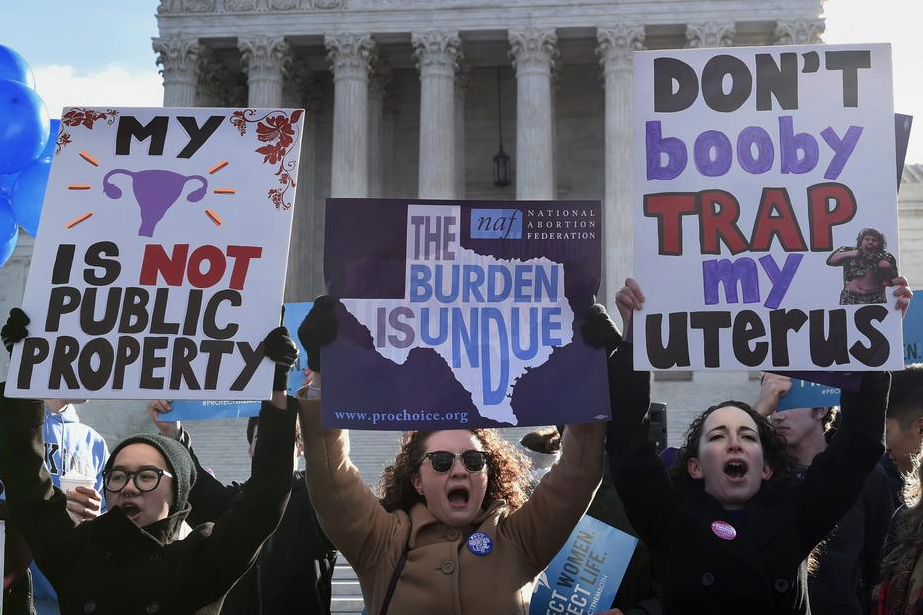Last Wednesday, the Supreme Court heard oral arguments in the Texas abortion case, Whole Woman’s Health v. Hellerstedt (formerly v Cole), the most important women's rights case that we have seen in the last 25 years. Two days later, a decision was made on the Louisiana case that could potentially leave the state with just 1 abortion clinic. The Louisiana case is strikingly similar to that of the Texas case and HB2 laws.
The Supreme Court heard oral arguments in the Texas case,
Whole Woman’s Health v. Hellerstedt (formerly v Cole) last Wednesday. The case is functionally about overturning Roe v. Wade and reinstituting state bans on abortion. It's the third in a trilogy of important legal cases surrounding the constitutional right to abortion- one that started with Roe V Wade in 1973 and continued into 1992 with Planned Parenthood V Casey. The Casey decision said that states cannot place "undue burdens" on abortion before fetal viability- undue burdens including “unnecessary health regulations that have the purpose or effect of presenting a substantial obstacle to a woman seeking an abortion."
The four liberal judges on the court are expected to vote
against the law, agreeing that the law intrudes on a woman's constitutional
right to abortion. They would need five votes for a victory. but considering
the death of conservative Justice Antonin Scalia last month, the playing field
is now even with 4 liberal and 4 conservative justices. 3 of the 4 conservative
justices are for the law. Kennedy, the 4th conservative justice, however was on
the fence and also suggested sending the case back to the lower court for
evidence on the law's impact and the ability of existing Texas clinics to meet
the demand for abortions. The outcome appears to be in his hands at this point.
In past abortion cases, he has backed a fundamental right to abortion while
supporting some restrictions so there is some hope.
A ruling is due by the end of June. A 4-4 split decision would mean that the law
would be upheld, leaving 5.4 million Texas women with even more limited access
to what should be a constitutional right. The justices could also opt to send
the case back to a lower court or rehear the case once the vacancy is filled,
which could mean the dispute might not be resolved for years.
Two days after the Supreme Court heard arguments in the
Texas case, they ordered a stay on a Louisiana law that would leave the state
with only one abortion clinic. Similar to the Texas case and HB2 laws, the
Louisiana law required doctors at abortion clinics to have admitting privileges
at nearby hospitals. The stay means that the law will not be enforced while it
is still being challenged in the courts, a move that allowed two recently
closed abortion clinics to re-open. Word is that the law will remain blocked
until a decision is reached in the Texas case.
See part of my original post on the Texas case below:
Whole Woman’s Health v. Cole (now Hellerstedt) challenged
HB2, the 2013 Texas law that requires abortion care facilities to meet
expensive and unnecessary requirements that are not only medically unnecessary,
but near impossibly for most facilities to comply with. The law was passed to
seem as if it were protecting the health of women, but in reality the law has
nothing to do with health and safety, but instead is a disguised attempt to
shut down abortion care facilities and put an end to abortion altogether. In fact, many prominent medical associations,
including American Medical Association, (AMA) American Public Health
Association (APHA), and the American College of Obstetricians and Gynecologists
(ACOG), have publicly declared their opposition to HB2, stating that it
“jeopardizes the health of women in Texas”.
Texas had 42 abortion clinics before HB2, but after its
passing this number fell to just 19. A
Supreme Court ruling in favor of upholding HB2 laws puts the remaining clinics
in danger and could leave just 10 clinics open for 27 million people living in
the state. The larger threat of a favor ruling is that anti-abortion laws could
expand other states' rights to restrict abortion access. Whole Woman’s Health
v. Cole (now Hellerstedt) will have an impact on clinics and access to safe
abortion care nationwide.
Labels:
Women








